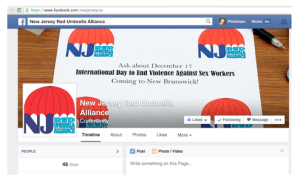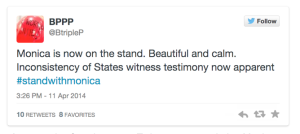Each year we take a moment to reflect on our actions and to consider how movements for rights in the United States are developing. Here is 2014 in review.
New beginnings and some goodbyes: We rarely celebrate the leaving of a person or the end of an era, but in October 2014 BPPP was most pleased to farewell the “prostitution free zone” legislation in the District of Columbia. The legislation was struck down after almost a decade of united advocacy by transgender and sex worker rights leaders. We were also pleased to welcome the birth of the New Jersey Red Umbrella Alliance and supported the development of this new local organizing with technical support and more. BPPP was pleased to support NJRUA by the first blog post of the nascent group decoding the “Superbowl” hype of early 2014. 
Stand with Monica Jones Campaign: Many across the nation were made acutely aware of the impact of policing of anti-prostitution statutes on transgender women when Monica Jones (a transgender rights activist and student of social work) was arrested in May 2013 after protesting Project ROSE (a collaboration between Phoenix police and Arizona State University School of Social work that has lead to numerous arrests in the city of Phoenix). BPPP has provided ongoing support to Phoenix organizers, standing in solidarity with them, linking them to resources available to defend human rights defenders like Monica Jones, connecting to social workers concerned about the arrest and the ethics of Project ROSE, and providing information and commentary. November 26, 2014, after several court appearances in which she was supported by the ACLU-AZ, Monica Jones learned that that Project ROSE has been cancelled. 
Online presence, commentary and publications:
Conferences: BPPP publicized HIV/AIDS policy concerns through participation in the AIDS2014 (the International AIDS Conference in Melbourne Australia) and ensured community reporting and participation. This material was provided in English and Spanish. We provided technical assistance to ten advocates applying to attend the International AIDS conference and reported globally on the conference via Twitter and other forms of social media.
Fundraising: BPPP helped make organizations and individuals aware of the ways they can support rights based organizing through presentations at funders convenings and direct action. In 2014 BPPP developed a successful online direct donation campaign to support advocates planning to attend the International AIDS Conference in Australia.
Reports: BPPP worked with the Desiree Alliance and SWOP-NYC/SWANK and groups from around the United States to produce the second national UPR report to the United Nations. Citing examples from Baltimore to Phoenix, from New Orleans to Chicago, the report draws on the most recent research and media reports on human rights abuses against people in sex trades as well as interviews with sex workers and advocates. The report’s list of recommendations starts by calling on the U.S. government to make good on a commitment it made in 2011 to the UN to address discrimination and violence against sex workers.
United Nations Advocacy: In March 2014, advocates from the Best Practices Policy Project and SWOP Phoenix traveled to the United Nations to raise concerns about the arrest of Monica Jones and the abuses caused by policing and Project ROSE to the Human Rights Committee during the review of the United States under the International Covenant on Civil and Political Rights (ICCPR). We were pleased to note that “Concluding Observations” from the Committee included important points on racial profiling, police abuse, and immigrants’ rights. The Committee also called on the U.S. to re-align its anti-human trafficking efforts with human rights norms, which reject criminalizing people who are trafficked. Importantly, the Committee’s report placed the problem of forced labor within a larger framework of economics and immigration policies, and noted its concern “about the insufficient identification and investigation of cases of trafficking for labor purposes.” A report detailing this advocacy is available at our website.

Leave Your Response